Partners,
The following are a series of posts that I hope you find helpful as you and your community members respond and begin to recover from Laura.
Feel free to share any and all of the following suggested posts with your residents on Nextdoor and other social channels. If you’d like to request that I write a post for you, please fill out this form.
If your public agency is not yet utilizing our free government platform to communicate with you can get started here.
Subject: Stay out of floodwater
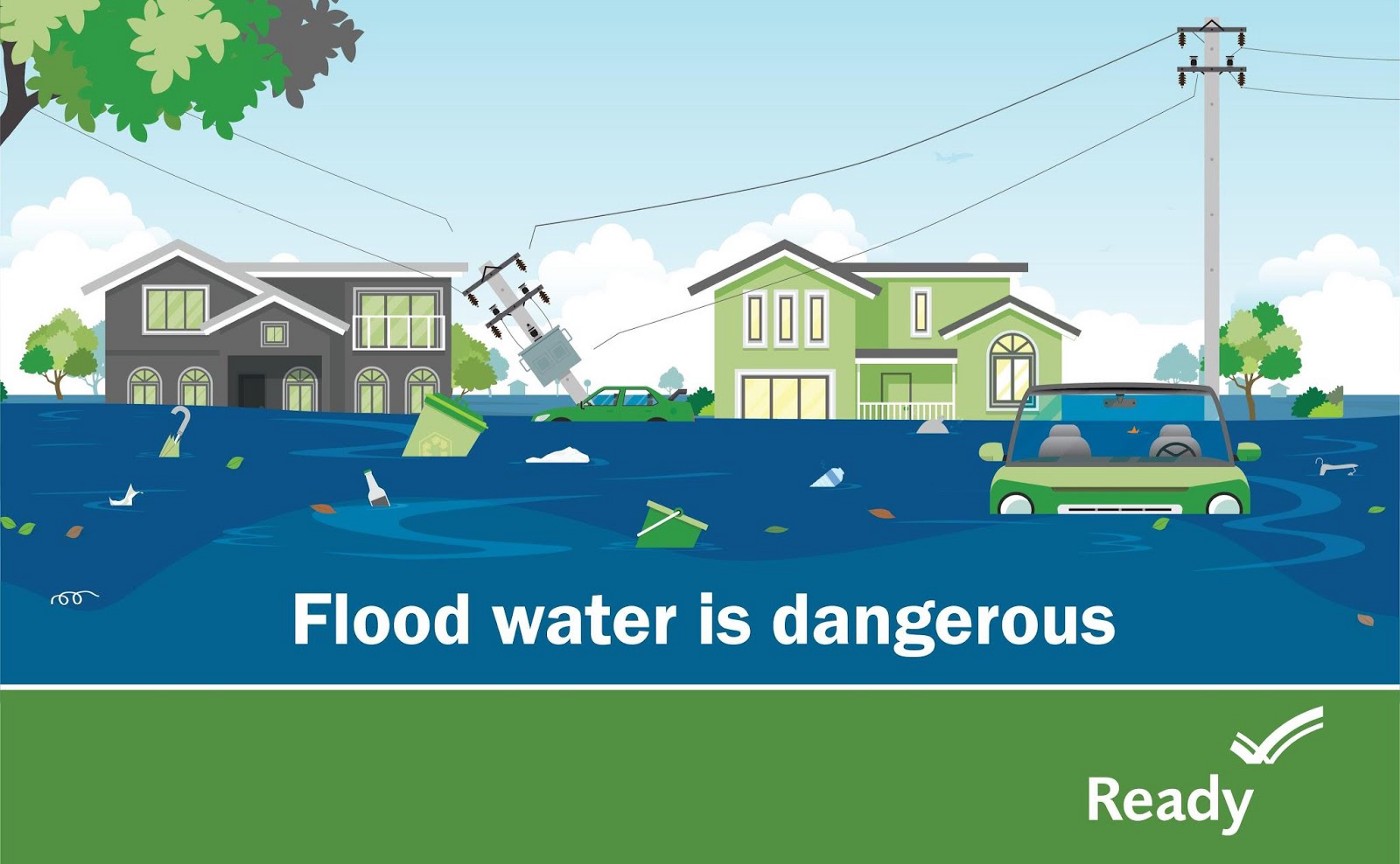
Floodwater can pose a drowning risk for everyone — regardless of their ability to swim. Swiftly moving shallow water can be deadly, and even shallow standing water can be dangerous for small children.
1) Always follow warnings about flooded roads.
2) Don’t drive in flooded areas — cars or other vehicles won’t protect you from floodwaters. They can be swept away or may stall in moving water.
Floodwaters contain many things that may harm health. We don’t know exactly what is in floodwater at any given point in time.
Floodwater can contain:
- Downed power lines
- Human and livestock waste
- Household, medical, and industrial hazardous waste (chemical, biological, and radiological)
- Coal ash waste that can contain carcinogenic compounds such as arsenic, chromium, and mercury
- Other contaminants that can lead to illness
- Physical objects such as lumber, vehicles, and debris
- Wild or stray animals such as rodents and snakes
Exposure to contaminated floodwater can cause:
- Wound infections
- Skin rash
- Gastrointestinal illness
- Tetanus
- Leptospirosis (not common)
It is important to protect yourself from exposure to floodwater regardless of the source of contamination. The best way to protect yourself is to stay out of the water.
If you come in contact with floodwater:
- Wash the area with soap and clean water as soon as possible. If you don’t have soap or water, use alcohol-based wipes or sanitizer.
- Take care of wounds and seek medical attention if necessary.
- Wash clothes contaminated with flood or sewage water in hot water and detergent before reusing them.
If you must enter floodwater, when possible, wear rubber boots, rubber gloves, and goggles.
Subject: Evacuated and staying with friends or family or at a shelter?
If you have evacuated and are staying with friends or family outside your household please keep the following in mind:
- Talk to the people you plan to stay with about how you can all best protect yourselves from COVID-19.
- Be sure to consider if either of your households has someone who is at higher risk of developing severe illness from COVID-19, including older adults or people of any age who have underlying medical conditions. Make sure everyone knows what they can do to keep them safe from COVID-19.
- Follow everyday preventive actions, including covering coughs and sneezes, washing your hands often, and avoiding touching your eyes, nose, and mouth with unwashed hands. Consider taking extra precautions for people living in close quarters.
- Know what to do if someone in your family or in the household you are staying with becomes sick with COVID-19. Take steps to keep your pets safe
If you are staying at a shelter:
- Practice social distancing. Stay at least 6 feet from other people outside of your household.
- Follow CDC COVID-19 preventive actions — wash your hands often, cover coughs and sneezes, and follow shelter policies for wearing masks. Avoid sharing food and drink with anyone if possible.
- Follow disaster shelter policies and procedures designed to protect everyone in the shelter, especially those who are at higher risk for severe illness from COVID-19, including older adults and people of any age who have serious underlying medical conditions.
- Avoid touching high-touch surfaces, such as handrails, as much as possible. Wash hands with soap and water for at least 20 seconds or use hand sanitizers with at least 60% alcohol immediately after you touch these surfaces.
- Keep your living area in the shelter clean and disinfect frequently-touched items such as toys, cellphones, and other electronics.
- If you feel sick when you arrive at the shelter or start to feel sick while sheltering, tell shelter staff immediately.
For more information, please see — https://www.cdc.gov/disasters/covid-19/hurricane_key_messages_covid-19_annex.html
Subject: Not sure if your water source will be safe after Laura?
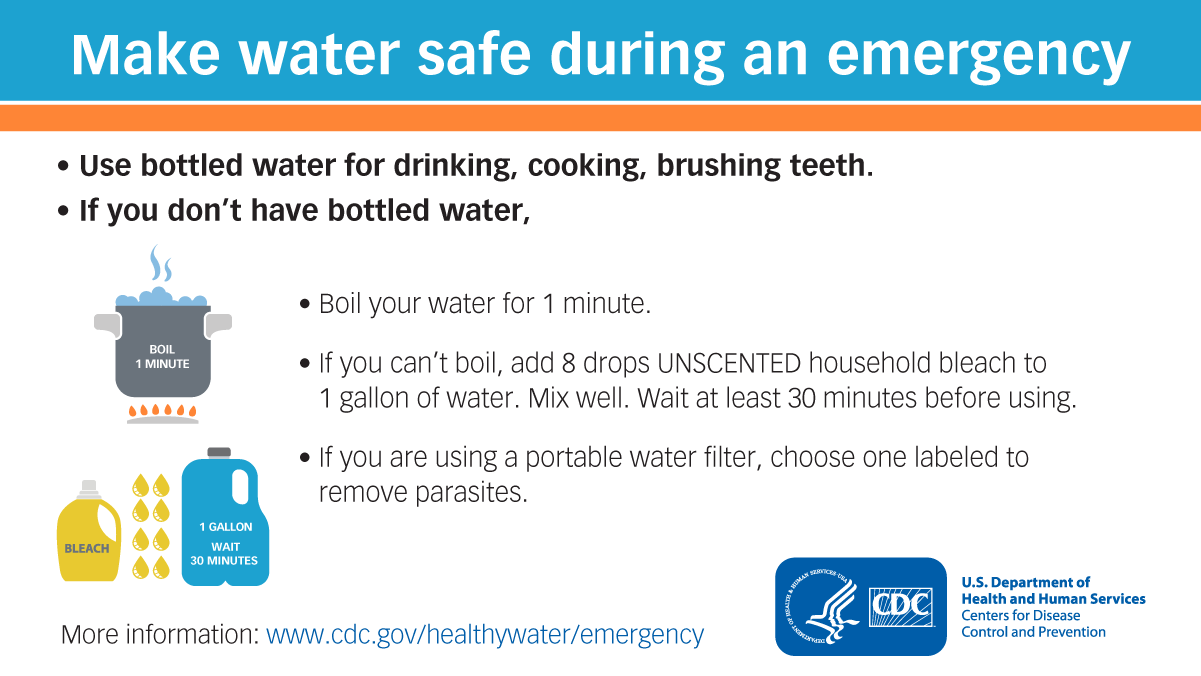
Neighbors,
In an emergency, water contaminated with germs can often can be made safe to drink by boiling, adding disinfectants, or filtering.
IMPORTANT: Water contaminated with fuel or toxic chemicals will not be made safe by boiling or disinfection. Use bottled water or a different source of water if you know or suspect that your water might be contaminated with fuel or toxic chemicals.
If you don’t have safe bottled water, you should boil your water to make it safe to drink. Boiling is the surest method to kill disease-causing organisms, including viruses, bacteria, and parasites.
You can improve the flat taste of boiled water by pouring it from one container to another and then allowing it to stand for a few hours, OR by adding a pinch of salt for each quart or liter of boiled water.
If the water is cloudy:
1) Filter it through a clean cloth, paper towel, or coffee filter OR allow it to settle.
2) Draw off the clear water.
3) Bring the clear water to a rolling boil for 1 minute (at elevations above 6,500 feet, boil for three minutes).
4) Let the boiled water cool.
5) Store the boiled water in clean sanitized containers with tight covers.
If the water is clear, follow steps 3 through 5 above.
If you don’t have safe bottled water and if boiling is not possible, you often can make small quantities of filtered and settled water safer to drink by using a chemical disinfectant such as unscented household chlorine bleach. For more information on how to safely use disinfectants see this webpage — https://www.cdc.gov/healthywater/emergency/making-water-safe.html
Subject: During a power outage, keep refrigerator and freezer doors closed.
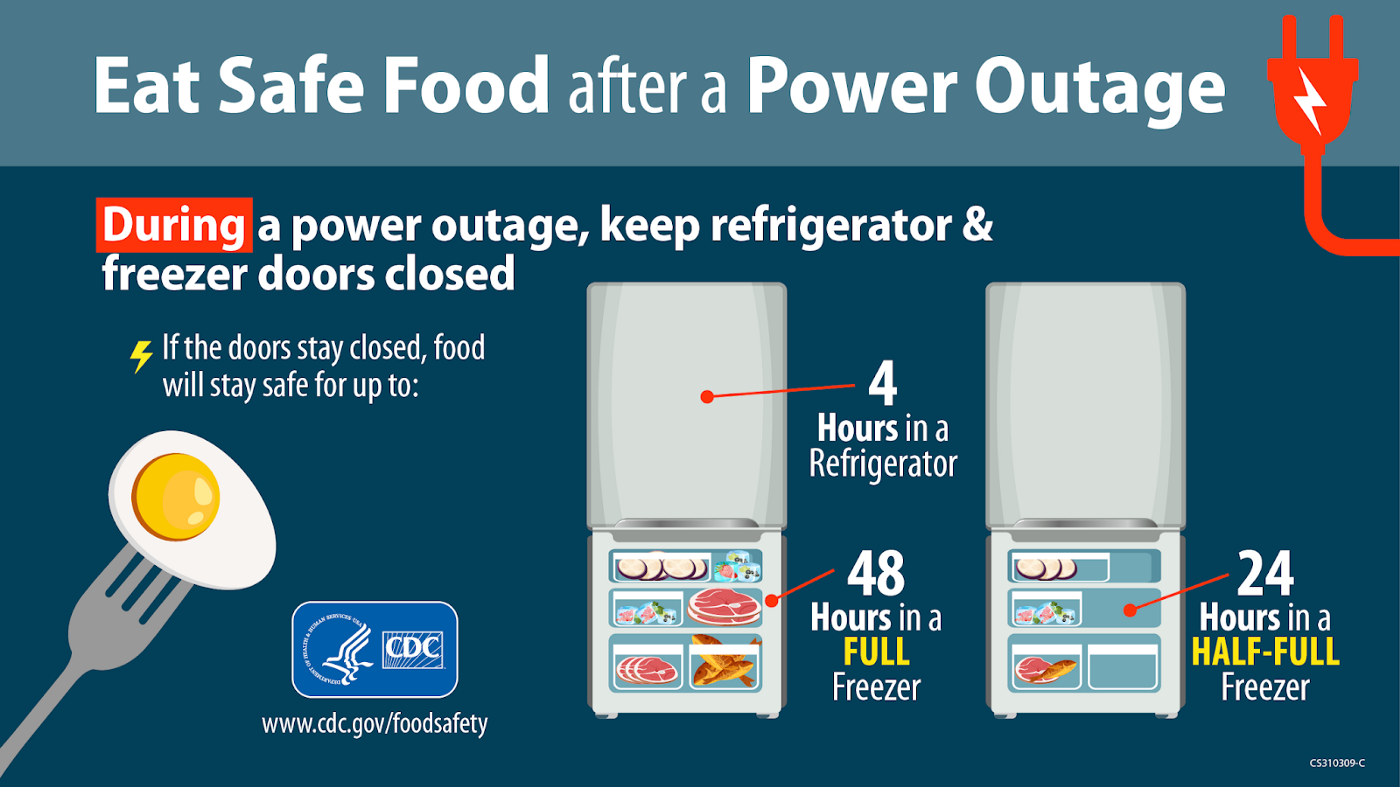
Neighbors,
Below are tips to keep your food safe during a power outage. If you have other tips, leave them as a comment.
- Keep appliance thermometers in your refrigerator and freezer. The refrigerator should be at 40°F or below. The freezer should be at 0°F or below.
- Freeze containers of water and gel packs to help keep your food at 40°F or below.
- Have a cooler and frozen gel packs handy in case you have to remove your food from the refrigerator to keep it cold.
- Buy dry ice or block ice to keep your food cold in the refrigerator, if you think the power will be out for a long time.
Subject: After a power outage, throw out perishable food in your refrigerator after 4 hours.
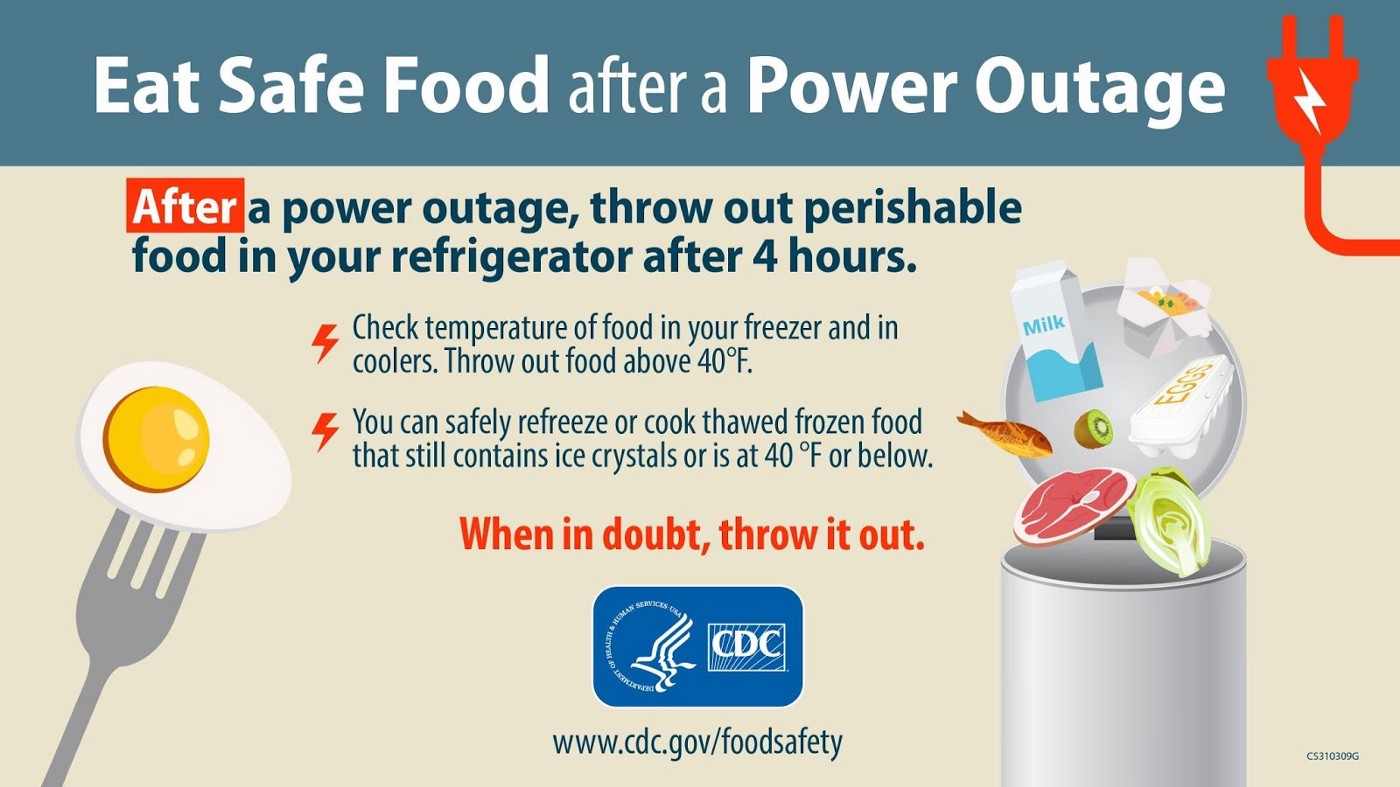
Neighbors,
Below are tips to keep your food safe after a power outage. If you have other tips, leave them as a comment.
- Never taste food to determine if it is safe to eat. When in doubt, throw it out.
- Throw out perishable food in your refrigerator (meat, fish, cut fruits and vegetables, eggs, milk, and leftovers) after 4 hours without power or a cold source like dry ice.
- Throw out any food with an unusual odor, color, or texture.- Check temperatures of food kept in coolers or your refrigerator with an added cold source.
- Throw out food above 40°
If you have an appliance thermometer in your freezer, check to see if it is still at 40 °F or below. You can safely refreeze or cook thawed frozen food that still contains ice crystals or is at 40 °F or below.
SUBJECT: Generators should always be used OUTSIDE the home
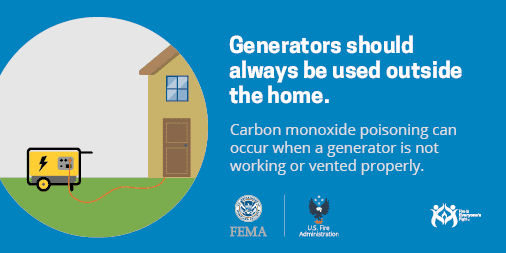
Did you know that it is only safe to use generators outdoors in well-ventilated areas away from all doors, windows, and vents?
If the power goes out, many of you will turn to generators. If you do, make sure you have carbon monoxide alarms in your home and do not use a generator in a wet area as this can cause shock or electrocution.
Also, be sure to connect appliances to the generator with heavy-duty extension cords. Do not fuel your generator when it is running as spilling gas on a hot engine can cause a fire.
If you have other generator tips, leave them below.
SUBJECT: See damage, reply to this post with a picture and location
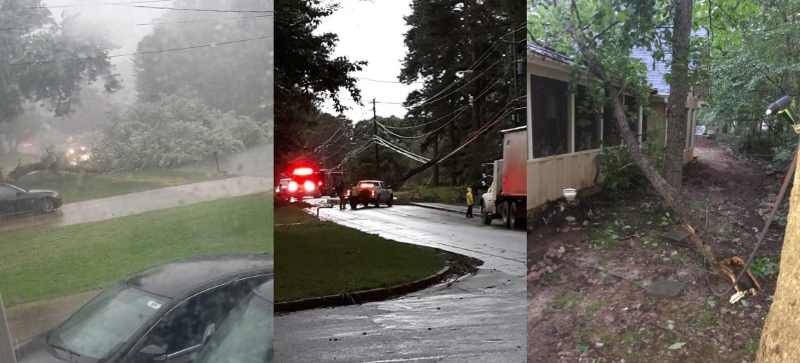
Neighbors,
If your property or nearby trees, power lines, roads, bridges, or buildings get damaged, it would be helpful to us if you would kindly take a picture and reply to this post with the location, description, and image. We will use this information to help coordinate a response if needed.
Please only venture outside if it is safe to do so.
SUBJECT: Hurricane Laura Home Clean Up Hotline (844) 965–1386
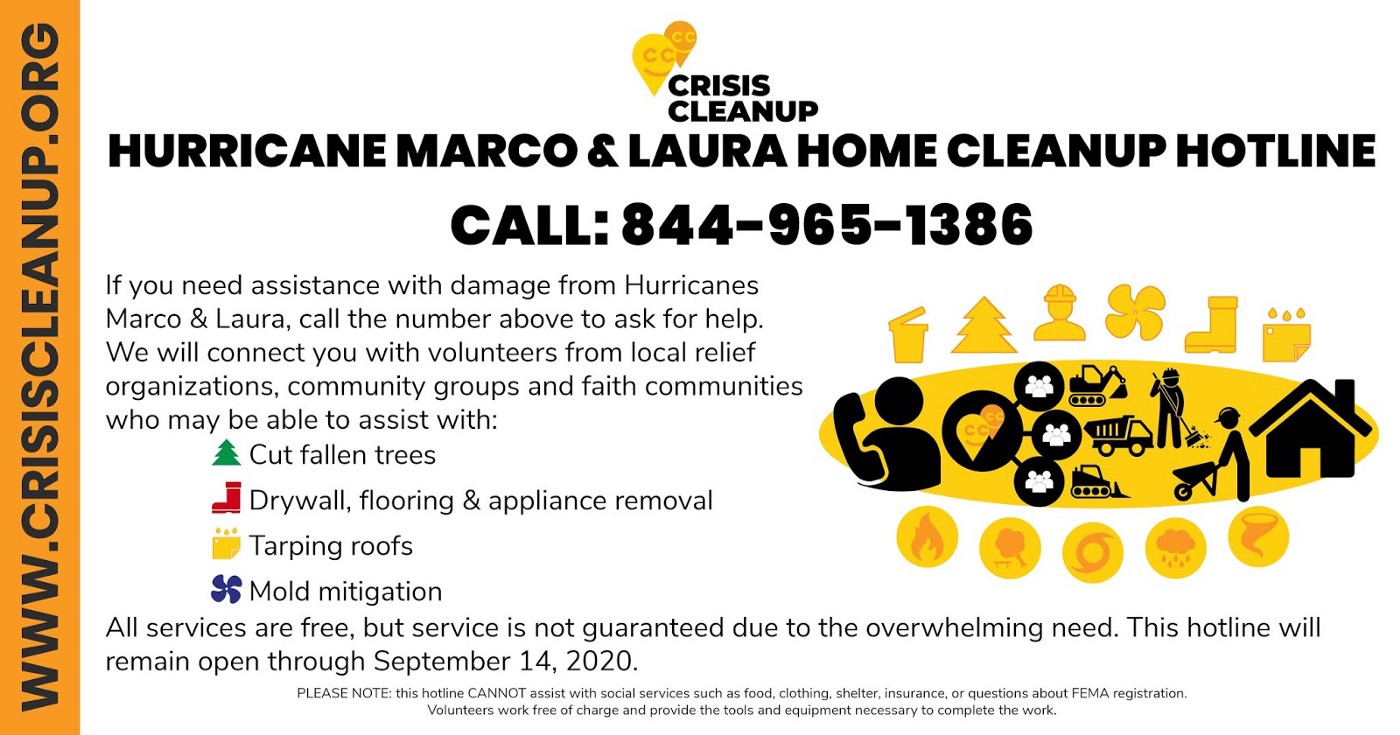
Neighbors,
A Home Cleanup Hotline for survivors of Hurricane Laura will be open through September 14th, 2020. Call the number below for help with home cleanup. As they are able, reputable and vetted relief agencies may assist you and your neighbors in cutting fallen trees, removing drywall, insulation, flooring, furniture, appliances, tarp roofs, etc. All services are free, but the service is not guaranteed due to the overwhelming need.
TO REQUEST HELP CALL: (844) 965–1386
PLEASE NOTE: This hotline CANNOT assist with social services such as food, clothing, shelter, insurance, or questions about FEMA registration. Volunteers work free of charge and provide the tools and equipment necessary to complete the work.
If you know of other resources, please share them with your neighbors below.

